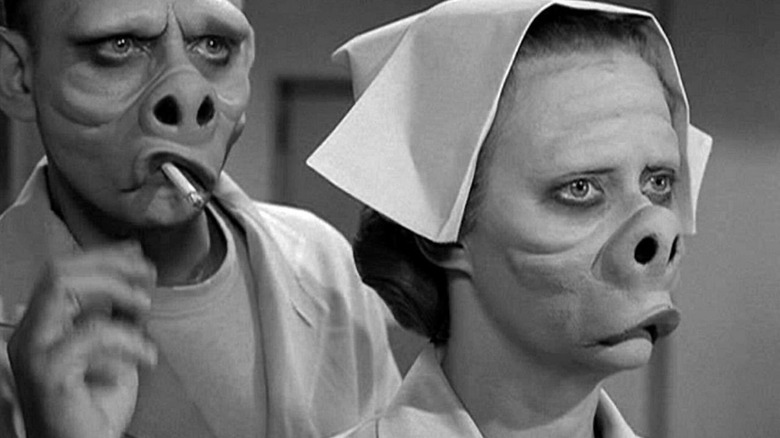“Uglies,” Netflix’s newest large film adaptation of a younger grownup novel, takes place in a dystopian society through which teenagers are anticipated to undergo an excessive beauty surgical procedure at 16 to make them “fairly.” (Spoiler alert: This technique seems to be unhealthy.) The movie initially caught some flak on-line for its option to forged conventionally enticing actors for the primary “Ugly” roles, however director Joseph McGinty Nichol (broadly generally known as McG) has clarified that there is a fairly good purpose for this. As he defined in an interview with The Wrap:
“We’re saying it is by no means sufficient […] I feel, in case you spoke to among the most universally regarded stunning individuals on the planet, they’re among the individuals with essentially the most intense physique dysmorphia. No person’s immune from this toxicity that is on the market of ‘It is by no means sufficient. You’ll be able to at all times have a thinner waist, larger hips, fuller lips.’ Take your decide. You see it on the market daily, and this film is supposed to be the antidote to that mind-set.”
Certain sufficient, “Uglies” just isn’t essentially a narrative concerning the worth of magnificence, but additionally about the concept magnificence just isn’t an goal factor. Necessary beauty procedures aren’t simply unhealthy as a result of bodily magnificence shouldn’t be given a lot significance in society, but additionally as a result of magnificence requirements are continuously evolving in methods which are unattainable to pin down. Or, as “The Twilight Zone” creator Rod Serling would possibly put it, magnificence is within the eye of the beholder. That is why it is no shock that “The Twilight Zone” was a significant inspiration for “Uglies” creator Scott Westerfeld.
Uglies truly attracts from a number of Twilight Zone episodes
The apparent assumption is that “Uglies” was impressed by “The Eye of the Beholder,” the basic 1960 episode a couple of lady who’s deemed hideous by the society she lives in, solely to be revealed as a complete smokeshow by our requirements. It seems that “stunning” on this society means having pig-like facial options, which the medical doctors and nurses all share. Everybody remembers the massive reveal scene, however much less talked about is the episode’s quasi-happy ending, the place the heroine will get the prospect to take pleasure in life in a separate group with all the opposite “hideous” rejects. Certain, no one on this episode learns any classes concerning the subjectivity of magnificence, however a minimum of ultimately the primary character is not compelled to sacrifice her humanity in an effort to slot in.
“Uglies” explicitly pays tribute to this episode in a sequence the place its foremost character, Tally (Joey King), sneaks into the Fairly City by disguising herself with a pig masks — one which’s awfully paying homage to the masks in “Eye of the Beholder.” It is good to know that, regardless that the episode got here out 64 years in the past, it is nonetheless having such a robust affect on popular culture. A very good story actually can stick in public consciousness far longer than anybody on the time would’ve guessed.
However maybe the extra apparent comparability to “Uglies” is the season 5 “Twilight Zone” episode “Quantity 12 Appears to be like Simply Like You.” This one takes place in a society the place youngsters are all compelled by means of a course of known as “transformation,” which makes them stunning on the expense of killing their individuality and their capability for empathy. Like with “Uglies,” the primary character initially resists the process, solely to search out that staying true to herself on this world is even more durable than it appeared.
Westerfeld even wrote a weblog publish in 2008 concerning the episode, saying that he “hadn’t seen this gem since I used to be a bit child, so I would forgotten all the small print.” You would possibly count on him to be defensive in opposition to potential copycat allegations, however Westerfeld rightly identified that “The Twilight Zone” was hardly the primary present to cowl this territory both. As he wrote in his publish:
“After all, obligatory cosmetic surgery is a venerable theme in sf. Not stunning, provided that the primary elective nostril job occurred a couple of century in the past, about the identical time as H.G. Wells was writing ‘Warfare of the Worlds.’ […] Different early fictional examples of obligatory beauty/mind surgical procedure embody L.P. Hartley’s 1960 story ‘Facial Justice,’ Kurt Vonnegut’s ‘Harrison Bergeron’ (1961), and naturally Ira Levin’s ‘Stepford Wives’ (ebook: 1972; movies: 1975, 2004).”
“Uglies” is now streaming on Netflix.

